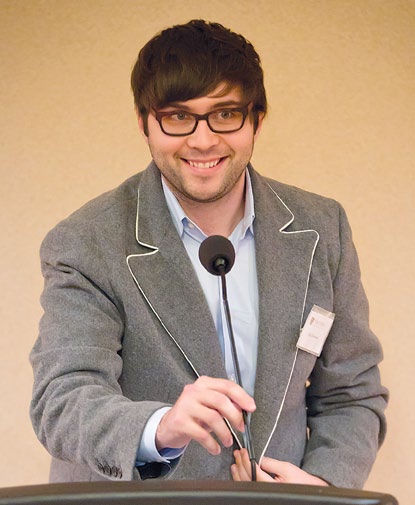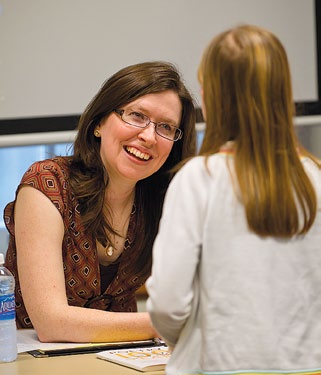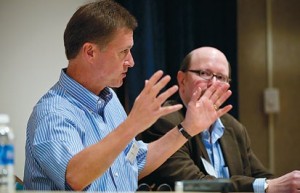Gail Segal (’74)
Listening to Provost (Ed) Wilson (’43) read aloud and unpack the poems of Blake, Yeats and Thomas, I fall in love. I am dizzied and uncertain as to what exactly I’ve fallen prey to. I am just 19. Such is the spell cast by Dr. Wilson (and in spring, no less). I cling to the texts for gravity and only later, years later, do I name the gifts: song from Dylan Thomas, mystic vision from Blake, and from Yeats, an extended love affair with syntax. When it occurs that lyric force such as I’ve heard in a classroom on an upper floor of Tribble Hall can be crafted in a single sentence or line or sequence of lines, all hell breaks loose. And so it is today. Love.
Gail Segal makes poems, films and teaches in the Graduate Division of Film at New York University.
Bill McIlwain (’49)
In my time at Wake Forest, there were a number of quite good writers and editors who became fine professionals after graduation. We all liked each other. It was a tight little community, and we spent a lot of time together. Harold Hayes (’48) was not many years out of Wake when he became editor of Esquire. The Friedenberg brothers, Walt (’49) and Ed (’50), became good newspapermen, Walt a foreign correspondent. Bynum Shaw (’48) was both a fine newspaperman and teacher. I had started writing early and became sports editor of the Wilmington Star-News when I was 17 and still in high school. I got better at Wake Forest, I think, partly because I was stimulated by my friends, the good young writers I hung out with.
Bill McIlwain is an editor and writer who has worked on nine newspapers, including serving as editor of Newsday. His most recent book is “Dancing Naked with the Rolling Stones.”
Betsy Bell Riley (’80)
I have always been in love with words. For decades, I’ve put up with reporting just so I could sit down and write. Like many other WFU English majors, I credit Provost (Ed) Wilson with encouraging my passion for language. I took every course he taught and dragged my entire family to the Lake District in England. However, I knew I wasn’t cut out to be either a poet or an investigative reporter, so I resigned myself to some other career. It was Ralph Wood in the religion department who kept me from giving up. In his Religion and Literature course, we discussed how authors used description, metaphor and narrative to mine human character. I knew this was what I wanted to do. He gave me the courage to pronounce myself a writer, which somehow got me a job as a medical reporter — even with no clips from a college paper and no journalism courses.
Betsy Bell Riley is executive editor of Atlanta Magazine.
T. Davis Bunn (’74)
While at Wake Forest I completed a double major in economics and psychology, then did graduate studies in international finance — not the normal route for a novelist, I agree, but I did not start writing until age 28. The most powerful influence I had on my writing career while at WFU came from President Ralph Scales. In his introductory remarks to the newly arriving class of 1974, Dr. Scales told us that our time at Wake Forest would be the last time most of us had to completely revamp the world’s image, and our own, of who we were. I actually went on to redraft my personal definition of self twice more, but in each case Dr. Scales’ remarks remained a defining beacon. The opportunity for personal reinvention is a precious gift. I remain indebted to him for making me aware of just what it meant to take this step.
T. Davis Bunn has sold more than six million books in 16 languages and received three Christy Awards for excellence in historical and suspense fiction. His latest novel is “Book of Dreams.”
Eric Ekstrand (’07)
Conor O’Callaghan and Vona Groarke taught my first workshop at Wake Forest in 2005. That class was the first time I ever realized that poets were actual living, sneezing human beings, and I could be one too. I realized that there was some fantastic and life-giving work to take up, at which point it became very hard not to.
Eric Ekstrand teaches writing and literature at the University of Houston, where he received his MFA. His poems have appeared widely and can be found most recently in jubilat.
Michael Riley (’81)
Four muses come to mind. My first is Bynum Shaw, who embodied the best of real-world journalism, showing me the value of fact-based reporting with a big heart. My second is Ed Wilson, who taught me the rich resonance of depth and perspective. The third is Bob Shorter, who exposed me to the art of lyrical storytelling, starting with Chaucer’s “Prologue.” Finally, Elizabeth Phillips demonstrated the poetic power of words, clear and simple.
Michael Riley, a longtime magazine and newspaper journalist, is managing editor at Bloomberg Government in Washington, D.C.
Jennifer Trafton (’97)
My years at Wake Forest immersed me in the works of writers who have shaped my imagination ever since. I owe much to two professors in particular: Ralph Wood, who taught Religion and Literature (including the very popular class Faith and Imagination), and Ed Wilson, who taught British poetry. Dr. Wood was a mentor to me in many ways, not least in illuminating for me the writings of C. S. Lewis, J. R. R. Tolkien, Dorothy Sayers, George MacDonald, Flannery O’Connor, and others who have been literary kindred spirits. He assured me that the time I spent thinking and reading and writing would profoundly affect the kind of citizen, friend, sister, wife or mother I became. Dr. Wilson’s kind warning that we can choose to “do a great work, or live a great life” still echoes, and for the rest of my life, I think, when I read the beautiful words of Wordsworth or Coleridge or Yeats, they will resound in my heart in Dr. Wilson’s deep, sensitive voice.
Jennifer Trafton is the author of the children’s fantasy novel “The Rise and Fall of Mount Majestic.” She is currently revising her second novel and teaching creative writing to children in Nashville, Tenn. She is married to author A.S. Peterson.
D. Quincy Whitney (’74)
Pat Johansson saw in me the writer I wanted to be. Professor Shorter taught me the Medievalist’s fine line between sacred and secular; Ed Wilson, the undeniable universal power of poetry as both craft and meaning. Bynum Shaw not only exuded the thrill and challenge of chasing a story, he also asked Harold Hayes to sponsor me as an intern at Esquire in January 1973. My most vivid memory as a fact-checking assistant in the Research Department occurred the day I had to defeat my phone timidity in one fell swoop to interview Walter Cronkite, who could not have been more charming. I also recall a memorable Friday afternoon train ride north to visit Hayes’ country home when I saw another side to this remarkable editor that balanced out his hard edge and cutting sense of humor. I learned so much just by watching Hayes in action. I am forever indebted to Bynum Shaw. Both imbued in me the idea that the pursuit of a story was not enough — one had to listen to it as well and play it back with integrity and respect.
D. Quincy Whitney was a Boston Globe arts reporter for 14 years. She is writing the biography of Carleen Maley Hutchins, violinmaker extraordinaire. Read more at quincywhitney.com and hutchinsconsort.org.
Lisa Kline Mowry (’82)
When I took American Architecture and American Art — my two favorite classes while at WFU — Dr. Peggy Smith always demonstrated so eloquently the importance of words in the visual arts. Her classes weren’t just about memorizing paintings or buildings; she encouraged us to synthesize how architecture and art fit into the bigger picture of society, history and other arts. Every day, when I’m reviewing houses, writing about interior design, or even commenting on a homeowner’s favorite painting while on a photo shoot, I draw from those classes. I’m not even sure I would have had the confidence to pursue this career without that background.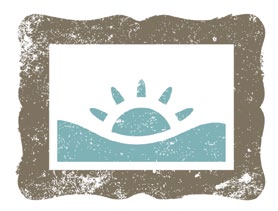
Lisa Kline Mowry is regional editor for Better Homes & Gardens, Traditional Home and other Meredith Publications. She is a regular contributor to Atlanta Magazine, Southern Living and other lifestyle publications.
Cameron Kent (’79)
I was fortunate to have a legion of wonderful influences at Wake Forest who would help shape my writing career. Among them was Dr. William Moss, who furthered my love of American literature. I clearly remember the first day in English comp as we went around the table and introduced ourselves … The student next to me said, “My name is James Joyce …” I remember thinking, “Wow. This must be the advanced class. …” One of the greatest mentors in my writing life was Bynum Shaw, who not only taught me the pillars of journalism, but also gave me the single best advice on becoming a novelist. He said simply, “A writer writes.” That’s all I needed to know.
Cameron Kent is an anchor and reporter at WXII 12 News in Winston-Salem, N.C. His third and latest novel is “Road to Devotion.”
Parker Bradway (’11)
One aspect that separates Wake Forest from almost any other institution is its relentless determination to educate the “whole person.” There was not one single moment in a particular class that led me to my vocation. Instead, it was the overall Wake Forest mindset to engage in creativity and exhaustively discover deeper passions in learning. Everyone from my professors, guest speakers on campus, school-sponsored events, and my classmates embodied this idea, and it challenged me to discover — and later pursue — my greatest love in life: songwriting.
Parker Bradway is a singer-songwriter in Nashville, Tenn. Find his songs at parkerbradway.com.
Doug Waller (’71)
An ensemble cast at Wake Forest inspired my writing career in different ways. I was totally captivated by the romantic poets courses Ed Wilson and Elizabeth Phillips taught. I would walk out of their classes convinced I wanted to be a poet. Of course, I had no hope of becoming one. I’ll never forget Dr. Phillips pulling me aside after class one day and gently telling me I might want to consider another career than writing verse. I was crushed. Dr. Phillips and I talked about it many years later, after I had become a published author, and she said she couldn’t imagine ever giving me such advice. But she had and I was better for it. The poems I attempted in college were terrible. Bynum Shaw, the journalism instructor at Wake Forest, taught me the craft of writing. More importantly he inspired me to become a journalist. I’ll never forget how he would quietly deliver his lectures on writing clearly and concisely — the points he wanted to make scribbled on three-by-five cards that he clutched in front of him. I would leave his class intent on becoming a journalist who would cover stories around the world and write books in my spare time, as Bynum had. I did end up writing stories on world events as a diplomatic correspondent. I wasn’t talented enough to write novels, as Bynum had, but I have been able to pen nonfiction books.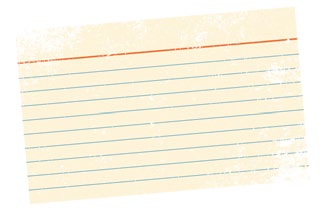
Doug Waller is a longtime Washington journalist, having worked as a reporter at Time and Newsweek. His latest book is “Wild Bill Donovan: The Spymaster Who Created the OSS and Modern American Espionage.”
A. Elizabeth Watson (’74)
Luckily, Wake Forest had something called Open Curriculum when I arrived in 1970 — no requirements except those associated with a major. That allowed me some detours. At first I thought that I would major in biology. My mother and father were both scientists, and I had taken a summer course in ecology at Western Carolina in 1969. But I hated the labs (indoors!) and Wake Forest’s excellent field biology work didn’t mature until after my time. Despite Bynum Shaw’s best efforts in a wonderful journalism course, my second thought, to major in English, came to naught as well. I loved philosophy, but I took my only course, under Gregory D. Pritchard, too late to major in it. I really enjoyed political science under Jon Reinhardt, and I can’t tell you why I didn’t major in that. Kindly Charles Allen of the biology department put up with my wayward ways as my adviser.
Ultimately, I chose to major in history. I think I just liked the way the storytelling of pure history captured my imagination. The power of story is a rewarding part of my work to this day, helping communities tell their stories as a way of investing in their heritage and inviting visitors to experience the authentic places where American history was made.
A. Elizabeth Watson is the author of “Saving America’s Countryside: A Guide to Rural Conservation” and co-producer of the film “Chesapeake: Living Off the Land.” She is principal at Heritage Strategies in Sugarloaf, Pa.
Katie Miller Scarvey (’83)
The thoughtful and incisive comments of Dr. Elizabeth Phillips on writing assignments done for her poetry class made me realize how powerful words are and gave me insight into why they resonated or didn’t. I learned that I could — and should — use my real voice rather than project one I imagined my professors wanted to hear. Dr. Phillips gave me some confidence when I was running dangerously low on that commodity — and I’m grateful that I got a chance to thank her for that many years later.
Katie Scarvey is the award-winning features editor at The Salisbury Post in Salisbury, N.C.
George Williamson Jr. (’61)
 In many ways, I reached my peak as a writer scribbling a column for the Old Gold and Black. My time as a college scribe began in the thick of campus issues begging to be opined about, and it ended in the larger historical arena of the civil rights movement. I got plenty of feedback, not only from stirred-up classmates, but also from faculty who critiqued my writing itself. Much of the better part of my subsequent life got its sprouts and basic nourishment in this Wake Forest hothouse.
In many ways, I reached my peak as a writer scribbling a column for the Old Gold and Black. My time as a college scribe began in the thick of campus issues begging to be opined about, and it ended in the larger historical arena of the civil rights movement. I got plenty of feedback, not only from stirred-up classmates, but also from faculty who critiqued my writing itself. Much of the better part of my subsequent life got its sprouts and basic nourishment in this Wake Forest hothouse.
George Williamson Jr. is a retired Baptist minister and founding president of the Baptist Peace Fellowship of North America. One of the WFU students who participated in the sit-ins in Greensboro to protest segregated lunch counters in 1960, he has written three book-length publications, including “Radicals, A Manifesto.” He lives in New York City.
Jenny Robinson Puckett (’71)
In my first semester at Wake Forest in 1967, it was my great fortune to learn from two master professors: Ed Hendricks in European history and Bob Shorter in English composition. Their subject matters were different, but both taught with a contagious energy. They taught me the difference between hearing and listening, and both encouraged the habit of reading widely. Also, from them I learned the pleasure of digging deep into something, and looking for the human story behind events, whether big or small.
 Jenny Robinson Puckett is a lecturer in the Department of Romance Languages and is author of “Fit for Battle: The Story of Wake Forest’s Harold W. Tribble.”
Jenny Robinson Puckett is a lecturer in the Department of Romance Languages and is author of “Fit for Battle: The Story of Wake Forest’s Harold W. Tribble.”
Lisa Mann DiMona (’83)
I’ve never considered myself to be a writer, but I appreciate writing and I admire writers. Thanks to an independent study senior year, I was able to pursue a career in publishing; I’ve been working with writers ever since. That independent study with Stuart Wright was meaningful, as was my journalism class with Bynum Shaw the year USA Today was launched. I may have done my best academic writing in Doyle R. Fosso’s Shakespeare class. When I turned my final paper in, I thought perhaps I’d gone off the deep end with it. The process had been completely immersive, but the risks paid off. I credit Dr. Fosso with teaching me how to explore — and explode — an idea.
Lisa DiMona has spent more than 25 years in book publishing and owns Lark Productions, a literary agency and book production company in Hastings-on-Hudson, N.Y.
